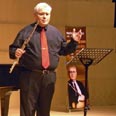
Moshe Epstein
Meet flautist Moshe Epstein
'Israel is a country at war and is not able to invest enough money in music education. There is also an increase in violence. With each school music teacher who is fired there will be 10 more knives in the school!'
I had the pleasure of interviewing Israeli flautist Professor Moshe Aron Epstein. Moshe teaches at the Academy Hochschule of Music and Theatre in Hamburg, Germany, and was here in Israel to spend time with family and perform four concerts, three of them all-Bach programs, together with harpsichordist Marina Minkin.
Pamela: Would you like to tell us about your music education?
Moshe: I was born in Kfar Ono, later known as Kiryat Ono, where they had the finest youth orchestra in Israel. I began learning the recorder at six years of age and the flute at eight and, of course, I played in the orchestra. As a teenager, I also conducted the Kiryat Ono Youth Orchestra. I attended the Thelma Yellin High School of the Arts and started studying the flute with Dr. Uri Toeplitz. After completing a music degree in flute and conducting at the Tel Aviv Academy of Music in 1975, I traveled to Europe, where I studied with Marcel Moyse and Aurel Nicolet in Switzerland and France.
Pamela: As I understand, you then returned to Israel.
Moshe: Yes. In 1981 I took up the job of principal flautist with the Israel Sinfonietta, Beer Sheba, also doing solo work. In 1984, I began teaching at the Jerusalem Academy of Music and Dance, becoming Dean of the Faculty of Performing Arts and conductor of the Academy chamber orchestra. I have conducted many Israeli orchestras, including the Israel Chamber Orchestra, the Ashdod Chamber Orchestra, the Kibbutz Orchestra and the Israel Sinfonietta.
Pamela: So what took you back to Europe?
Moshe: In 1999 I was offered the post of professor at the Hamburg Hochschule (Academy) of Music and Theatre. There, I teach flute, chamber music, acoustics and I run a workshop on the subject of Baroque music as played on modern instruments. I continue to perform in Europe, Japan, China and the USA.
Pamela: What are your ideas regarding the performing of Baroque music on modern instruments?
Moshe: In this synthesis of old and modern, it is necessary to develop a suitable language, to know what aspects of Baroque style to use and what aspects would not sound well on modern instruments. For example, vibrato is not the basis of the Baroque sound. I use it sparingly, for modern flutes played with none at all sound strange. In the concerts with Marina, played on a wooden flute which does not need vibrato in order to sound pleasing. If one can not play exactly as they did then, it is necessary to find ways of creating gestures to create the same effect for the modern listener, the emphasis being on knowledge and good taste. We live in a world of high volume and our nervous system must be very different from that of listeners in 1740. Baroque musicians sometimes claim that it does not matter on what instrument you play, but rather how you play it.
The truth is that I also play in ensembles with people performing on historical instruments. I must tell of an interesting experience I had with some Baroque players. Bach loved playing the organ at St Catherine’s Church in Hamburg. The church was bombed and mostly destroyed in the Second World War. They have concerts there in order to raise money to have the organ restored and I took part in one in which all the other players were authentic Baroque players. In fact, they brought along an A440 modern pitch harpsichord to accommodate my modern flute. After the concert, the viol player complimented me and asked me what traverso (Baroque flute) I had been playing!
In Germany I frequently perform with organ and have recorded a disc of arias and instrumental pieces for soprano, flute and organ called “Sweet Silence”.
Pamela: What are your plans for the near future?
Moshe: I want to continue performing and teaching.
Pamela: What do you aim to emphasize in your teaching?
Moshe: I feel the need to bring out the musical personality of the student and not just to work on technical efficiency. For many years I have had the feeling that musical performance was becoming a form of accurate technical work. However, a creative student will develop technical and musical intelligence in time. Good technique is a necessity but musical performance should come from a need to be expressive rather than from a need to succeed; the need to play should be the driving force behind performance. After all, music is an art.
I have students from seven different countries. These young people need to succeed, audition and find work in orchestras, and this reality comes out in today’s orchestral sound: playing is clean and together but has little individuality. It is so frustrating to hear how cerebral some young players are today. A player needs a good tone, some depth. The function of music is to appeal to the soul. I am “campaigning” to move the emphasis in teaching in that direction and some of my colleagues are joining me.
Pamela: How do you see the state of music and music education in Israel?
Moshe: There are many financial problems. Israel is a country at war and is not able to invest enough money in music education. There is also an increase in violence. With each school music teacher who is fired there will be 10 more knives in the school!
Pamela: Professor Moshe Epstein, many thanks for talking to “Living in Harmony” and sharing so many interesting ideas with us. We feel sure audiences are going to very much enjoy your Bach concerts in December and January.










